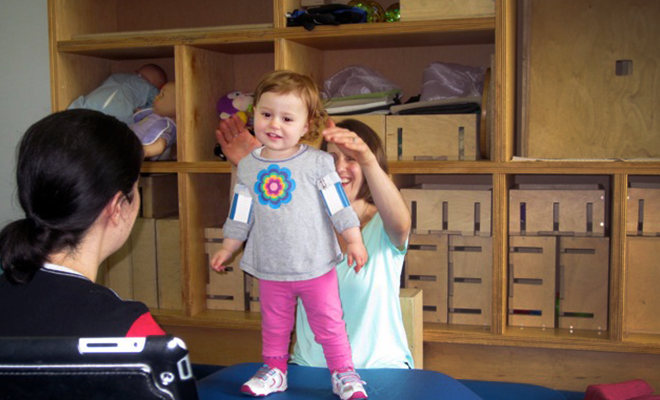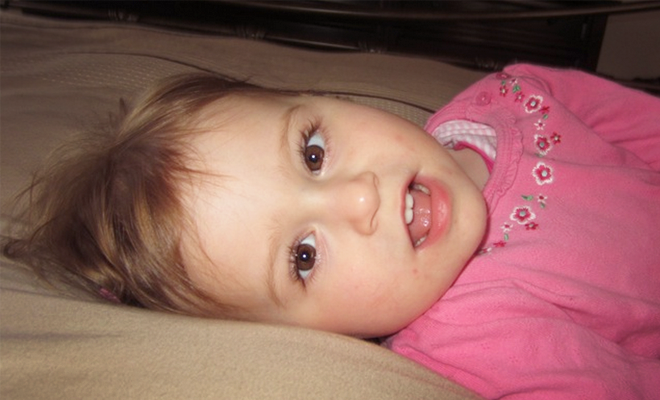Hope for Ava
October 24, 2014
5 min read
When Ava was born in August of 2012, her parents Jennifer and Herman Facchinelli were overjoyed to welcome their second daughter into their family.
What is Rett Syndrome?
Rett Syndrome is a rare genetic disorder that mainly affects girls. The odds of having it are 1:10000 girls. It is not hereditary, but strikes at random. Children with Rett Syndrome develop normally for the first 6 to 12 months, as Ava did, and then start to have a regression in skills.
Learn more about Rett Syndrome here.
At first, she seemed to be a perfectly healthy baby. But at around the nine month mark, Ava’s parents noticed some alarming developments or, more precisely, a lack of development.
“We noticed that she wasn’t trying to sit up or stand and that didn’t change even when Ava was around 15 months, so we became increasingly alarmed,” says Herman.
After months of research and countless doctors’ visits, Herman and Jennifer were finally given a diagnosis in June 2014: Rett Syndrome, a neurodevelopmental disorder that affects a child’s ability to use their hands, communicate and walk.
“This completely rocked our world. A lot of our hopes and dreams were shattered,“ says Jennifer.
“You have an image of what your life is going to be like and nobody assumes that something like this is going to happen. You don’t think about what could happen to your children, you think about the dreams you have for them.”
A Cure Within Reach
Since their daughter’s diagnosis, Jennifer and Herman’s dream is to see Ava walk and talk one day, just like their older daughter Clara. And given the latest advancements in research, their dream might indeed come true.

Rett Syndrome is poised to be the very first neurodevelopmental disease to be cured. Scientists pinpointed the gene responsible for Rett Syndrome back in 1999, which opened the door for a possible cure. A recent gene-therapy study has shown promising results, namely a complete reversal of Rett Syndrome symptoms in mice.
“There’s a lot of interest in the scientific community to find a cure, because this could be a stepping stone to curing other diseases like Alzheimer’s and Parkinson’s,” Jennifer says.
“Personally, I would switch places with Ava in a second. I’d give everything I owned for a cure to be found.“
To play their part in advancing the research, Jennifer and Herman decided to run their own fundraiser. With the help of family, friends and complete strangers, they’ve raised an astonishing $59,000 for charities involved in Rett Syndrome research.

“We’re blown away by how generous people have been and how interested they were in learning about the struggles of girls with Rett Syndrome, and how much hope there is,” Herman says.
State-of-the-Art Technology Helps Ava Communicate, Play
While they wait for a cure, the Facchinellis have built up hope for a better life with the help of an eye tracking device that helps Ava to express herself. With her eyes, Ava can control a mouse attached to a computer and choose from a wide variety of vocabularies and even play games.
“Ava has started to put two word combinations together. She is activating all of the buttons independently with her eyes and you can see that she is listening and responding to the conversation,” says Jennifer.
“Ava hasn’t been able to talk to us in any way or play with toys because of her lost hand skills. That’s why we’re so grateful to have access to this technology”
Her experience with Ava, she says, has been very different from what some medical studies suggest — likening children with Rett Syndrome to kids with autism and rating their cognitive abilities as very low.
“You can’t meet Ava and not love her. She’s such a character and she’s smart. She’s just trapped in her body. ”

Jennifer has taken a leave from her job as a teacher and spends much of her time on physio sessions and speech therapy for Ava so that she can “reap the benefits” once a cure is found.
Both parents are also training for a half-marathon in February 2015 and are making plans for a spring fundraising event to raise even more money and awareness for Rett Syndrome.
“Knowing that at this point, it is not a question of ‘if’ a cure will be found but ‘when’, is what really drives us. That’s why we’ll keep fundraising and keep hoping that something will come out of this.”

If you would like to help girls like Ava, please make a small donation to Herman and Jennifer’s Giving Group in support of Rett Syndrome research.
